

Holoportation: virtual 3D teleportation in real-time (Microsoft Research) Google's AI wins final Go challenge. Google's DeepMind artificial intelligence has secured its fourth win over a master player, in the final of a five match challenge.
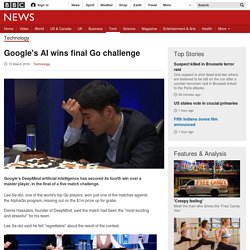
Lee Se-dol, one of the world's top Go players, won just one of the matches against the AlphaGo program, missing out on the $1m prize up for grabs. Google's AlphaGo AI beats Lee Se-dol again to win Go series 4-1. After suffering its first defeat in the Google DeepMind Challenge Match on Sunday, the Go-playing AI AlphaGo has beaten world-class player Lee Se-dol for a fourth time to win the five-game series 4-1 overall.
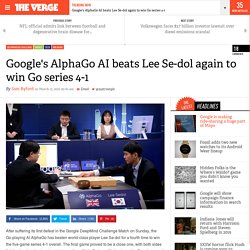
The final game proved to be a close one, with both sides fighting hard and going deep into overtime. AlphaGo is an AI developed by Google-owned British company DeepMind, and had already wrapped up a historic victory on Saturday by becoming the first ever computer program to beat a top-level Go player. The win came after a "bad mistake" made early in the game, according to DeepMind founder Demis Hassabis, leaving AlphaGo "trying hard to claw it back. " TED 2016: Meta augmented reality headset demoed at TED. Image copyright Meta An augmented reality headset has been shown off at the TED (Technology, Entertainment and Design) conference whose makers say could transform computing and communication.
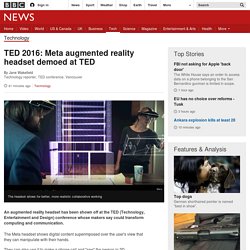
The Meta headset shows digital content superimposed over the user's view that they can manipulate with their hands. Time spent online 'overtakes TV' among youngsters. The real value of bitcoin and crypto currency technology - The Blockchain explained. PC Shipments Expected to Shrink Through 2016 as Currency Devaluations and Inventory Constraints Worsens Outlook, According to IDC - prUS25866615. Alternative Input Devices.
Introduction Individuals may have limitations that interfere with the ability to access computers.

Traditionally, a computer user accesses a computer with a standard point and click mouse and an external QWERTY keyboard (named for the top left-hand side of the rows). Solu: the Finnish pocket computer that wants to take over the world. Personal computers, says entrepreneur Kristoffer Lawson, haven’t changed much in 20 years.
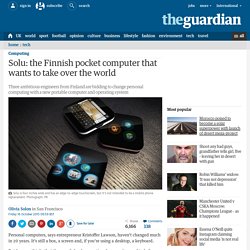
It’s still a box, a screen and, if you’re using a desktop, a keyboard. But Lawson thinks that the era of cloud computing deserves its own kind of computing device. Intelligent Machines: The jobs robots will steal first. Image copyright Thinkstock If you are sitting at a desk, driving a taxi or carrying a hod, stop for a moment and ask: could a robot or machine do this job better?
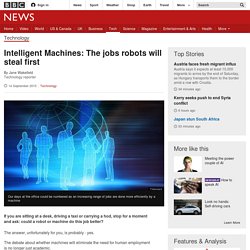
The answer, unfortunately for you, is probably - yes. The debate about whether machines will eliminate the need for human employment is no longer just academic. Boston Consulting Group predicts that by 2025, up to a quarter of jobs will be replaced by either smart software or robots, while a study from Oxford University has suggested that 35% of existing UK jobs are at risk of automation in the next 20 years. Office workers who do repetitive jobs such as writing reports or drawing up spreadsheets are easily replaced with software but what other jobs are under threat?
KFC Tray Typer - Tepsi Klavye. Microsoft zeigt Hololens Simulation auf der Build 2015. SmartEyeglass Developer Edition SED-E1: true augmented reality. Bill Gates interview: How the world will change by 2030. Microsoft HoloLens Demonstration Shows off Holographic Minecraft, Apps, and More.
Why Google Glass is not dead. Recently Google announced the end of the Google Glass explorer program and almost immediately the press declared Google Glass dead.
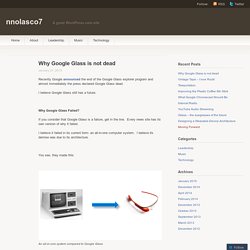
Teleportation. I think some people might find themselves in a need to send an object from one place to another at a remote location.
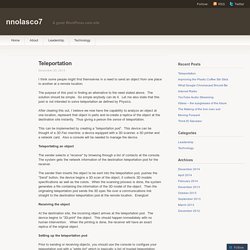
The purpose of this post is finding an alternative to the need stated above. The solution should be simple. Wearable devices. Hurdles To The Internet Of Things Prove More Social Than Technical. 10 predicciones transformadoras de TI para 2014 según Gartner ( parte 2) La consultora realiza una lista de tendencias tecnológicas que serán determinantes en un futuro próximo Los analistas de Gartner han publicado su siempre interesante y algunas veces controvertida visión de lo que la consultora estima que impactará la arena de las tecnologías de la información en el futuro próximo.

Algunas de las tendencias no son nuevas, como la denominada Internet de las Cosas y el Cloud Computing, pero otras son muy novedosas, como la impresión en 3D y las Redes Definidas por Software, e impactarán fuertemente las TI más bien pronto que tarde. Estos cambios se deben, en parte, al hecho de que en 2020 habrá hasta 30 mil millones de dispositivos conectados con direcciones IP únicas, la mayoría de los cuales serán productos. “Esto crea una nueva economía. Las 10 tendencias tecnológicas clave para 2014, según la consultora, son las siguientes: La Arquitectura Cloud/Cliente: los modelos de informática cloud/cliente están cambiando.
Imagine a world without shops or factories. I have come to think that our world is being turned upside down.

We probably do not grasp the huge implications because, perhaps, we are still imprisoned by our past. We are all of us, almost everywhere, swept up in a maelstrom of change which overturns many of the assumptions we have lived with for the past 100 years. That 100 years is important, because it is the span of the era of mass production ushered in just after 1910 by Henry Ford in Detroit. Market Challenges. Trends Map. The Future of Smartphones. From my perspective, the smartphone is today’s personal computer. An all-in-one computer system. It’s a mobile personal computer put into a tiny device. Not bad.
It gets the job done for on-the-go. All-in-one systems However, I think we need to separate the functions of the smartphone into different devices for processing, input and output. A desktop CPU and peripherals for input and output Welcome to the era of the Personal Communications Device (PCD) The PCD will be central device for mobile communications with the world. Touchscreen that reacts without touching. Leap Motion seals HP deal to embed gesture control technology. 16 April 2013Last updated at 13:08 ET By Dave Lee Technology reporter, BBC News The Leap Motion Controller is currently available as an external accessory Motion-control company Leap Motion has announced a deal to embed its technology within HP computers. The controller is able accurately to detect the movement of 10 fingers at once, allowing for intricate gesture-based controls.
Initially, the product will be aimed at consumers as a gaming and entertainment device. But the firm's president Andy Miller said partnerships with car and medical industries would be announced soon. Sergey Brin Says Google Glass Outdoes Smartphones - Yahoo! News. Google co-founder Sergey Brin is trying to get us excited about the company's Project Glass. This time he's doing it at the expense of smartphones, calling them "emasculating. " Brin spoke at the TED Conference in Long Beach, Calif. as part of its "Disrupt!
" session. Meta's Augmented Reality Glasses 2.0. Apple’s Planned ‘IWatch’ Could Be More Profitable Than TV - Bloomberg. <p>You need to enable Javascript to play media on Bloomberg.com</p> Play Why the iWatch Is the Next Big Thing. This Guy Hacked an NES Power Glove Into a Sweet Animation Tool. Most of us fantasize about being the badass kid with the Power Glove from The Wizard. Dillon Markey went and made that dream his day job. Markey is an animator for Adult Swim’s reliably bizarre stop-motion show Robot Chicken. His toolkit includes one very unique item: A modified Power Glove that wirelessly controls his animation software. His bespoke peripheral is the subject of this lovely short video by LA filmmaker Ava Benjamin. Wearable Gesture Control from Thalmic Labs. Myo + Smartglasses - Give your mobile workers super powers. Skully P-1 helmet packs a heads-up display, rear-facing camera and Android to keep motorcyclists safe.
This augmented reality motorcycle helmet could save your life. Introducing the GUARDIAN GA-1, the world's smartest helmet . O2's Tu Go aims to challenge Skype and other Voip apps. 1 March 2013Last updated at 07:11 ET Tu Go allows O2 users to make calls to mobile and landline numbers without having to buy extra credit O2 has launched an app which lets users make and receive phone calls and texts via a tablet, computer or smartphone. Tu Go is available for Android, Apple's iOS devices and Windows 7 PCs but limited to "pay monthly" subscribers - so excludes corporate accounts. Tu Go deducts charges from the user's existing call minutes allowance, unlike Skype and other chat apps which involve the purchase of credit.
Analysts suggest this billing innovation could prove disruptive. Isaac Asimov's 1964 Predictions About 2014 Are Frighteningly Accurate.